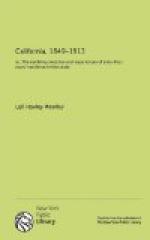Terry and Field, Shooting of Terry.
In open court the justice proceeded to read the decision. As he continued, the tenor was manifestly unfavorable to Mrs. Terry. She suddenly arose and interrupted the reading by violently upbraiding Field. He ordered her removal from the judicial chamber. She resisted, and Terry coming to his wife’s assistance, drew a knife and assaulted the bailiffs. He was disarmed, and together with his wife, overpowered and secured. The court of three judges sentenced Mrs. Terry to one month, and her husband to six months imprisonment, which they served in full. Justice Field returned to Washington, and the next year in fulfillment of his official requirements came again to California. He had been informed that Terry uttered threats of violence against his person, and therefore he was accompanied by a man employed by the Government to act in the capacity of body-guard. On the journey from Los Angeles to San Francisco, Field and his companion, with other passengers, left the train to lunch at Lathrop. Terry and his wife, who had boarded the cars en route, also left the cars and shortly afterwards entered the same restaurant. A few minutes later Terry arose from his seat, walked directly back of Field and slapped or struck the venerable justice on the face, while he was seated. Nagle, the guard who attended Field, leaped to his feet and shot Terry twice. Terry fell and died instantly. This event occurred on the 15th day of August, 1889, not quite thirty years from the time he shot Broderick.
Hetherington and Randall.
On the evening of July 24, 1856, the Vigilance Committee had another case on their hands which called for immediate action.
Joseph Hetherington, a well-known desperate character with a previous record, picked a quarrel with Dr. Randal in the lobby of the Nicholas Hotel. They both drew their revolvers and shot: after the second report the doctor dropped and Hetherington, stooping, shot again, striking the prostrate form in the head, rendering the victim almost unconscious. He died the next morning.
The shooting was brought about through Randal’s inability to repay money borrowed from Hetherington on a mortgage on real estate.




